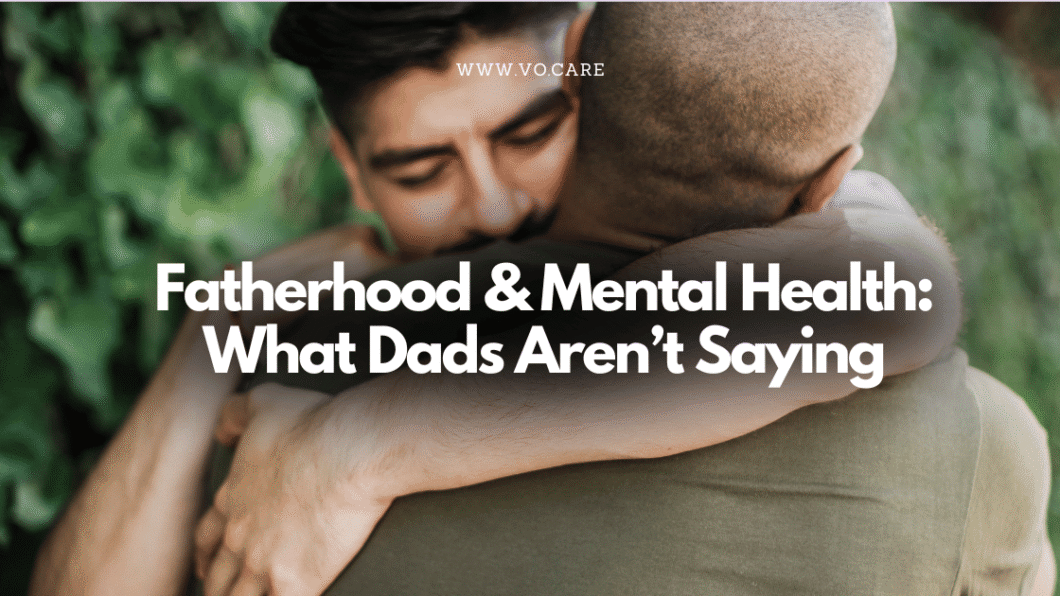TL;DR: Many dads experience depression and emotional strain—but few talk about it or get support. This Father’s Day, let’s start asking how they’re really doing and give them the tools to care for their mental health.
When we talk about mental health and parenting, dads are often an afterthought. Support for mothers has grown over the years, but paternal mental health remains largely overlooked, even though the data is clear: many fathers are struggling silently.
This Father’s Day, we’re starting a conversation about dad mental health—one rooted in science, empathy, and the understanding that caring for fathers is caring for families.
The Mental Load of Being a Dad
Becoming a father is life-changing. It brings purpose, pride, and joy. But it also introduces a unique set of pressures: sleepless nights, financial strain, shifting identity, and the expectation to be “the stable one.” Despite these demands, most new fathers aren’t screened for mental distress. They’re rarely asked how they’re adjusting emotionally. The result? Many dads don’t even realize they’re struggling until things begin to unravel.
Studies show that 8–13% of new fathers experience postpartum depression—a rate not far behind that of new mothers.
But because symptoms in men often look different—showing up as irritability, anger, emotional detachment, or increased alcohol use—many cases go undetected or misunderstood. What might be brushed off as stress or moodiness could actually be a sign of untreated paternal depression.
What Happens When Dads Are Struggling
The impact of a father’s mental health extends far beyond his own wellbeing. Studies have linked paternal depression to lower emotional responsiveness and reduced bonding with children. Over time, this can affect a child’s development—contributing to behavioral problems, language delays, and emotional regulation challenges. A longitudinal study even found that children of depressed fathers were more likely to develop emotional and behavioral issues during early childhood and adolescence.
Partners and family dynamics are affected too. Marital tension tends to rise when one parent is emotionally unavailable or carrying an invisible burden. Many fathers try to protect their loved ones by keeping their emotions in, but in doing so, they often isolate themselves from the very support they need.
Understanding the Risk Factors
Both biological and environmental factors influence mental health challenges in fathers. Emerging research shows that men experience hormonal changes during their partner’s pregnancy and after birth, including a drop in testosterone, which may influence mood and behavior. At the same time, external stressors like sleep deprivation, job insecurity, financial strain, and a lack of social support can add pressure during an already demanding period of adjustment.
Importantly, studies show that fathers are more likely to develop depression if their partner is also struggling. But unlike maternal postpartum care, which now often includes mental health screening, very few fathers are ever formally assessed. This gap in care means that many men carry symptoms for months or years without intervention.
Why Support Is So Often Delayed—or Never Reached
Social norms and stigma remain major barriers. Many men have been raised to equate strength with silence, and vulnerability with weakness. Admitting emotional distress—especially at a time when they’re “supposed” to be stepping up as a provider or protector—can feel threatening to their sense of identity. That internalized pressure often keeps dads from seeking help until they’re in crisis.
Even when fathers want support, they may not know where to turn. The healthcare system rarely provides routine mental health screening for fathers, and few parenting resources are designed with men in mind. This leaves many dads without a roadmap for what’s normal, what’s concerning, and how to get help.
What Happens When Fathers Receive Support
The science is clear: when dads receive mental health support, families thrive. Fathers who engage in therapy, peer groups, or use digital tools to manage their mental health often report greater self-confidence, stronger connections with their children, and more balanced partnerships. Early intervention leads to better long-term outcomes—not only for dads, but for the entire family system.
Even small changes in practice—like asking fathers how they’re feeling during pediatric visits—can make a difference.
What Dads Can Do—And Why It Matters
If you’re a father feeling overwhelmed, numb, or unlike yourself, you’re not alone—and you’re not weak. Recognizing that you’re struggling is a sign of awareness, not failure. Talking to someone you trust—a partner, a friend, or a mental health provider—can help lighten the load and create space for healing. If you’re not ready to talk in person, digital platforms like Vo.Care offer private, science-backed tools that fit your schedule and comfort level.
Prioritizing mental health doesn’t mean neglecting your responsibilities—it means strengthening your ability to show up fully, emotionally and mentally, for the people who rely on you.
Fathers are struggling silently—and it’s time we listened.
If you’re a father feeling overwhelmed, numb, or unlike yourself, you’re not alone—and you’re not weak. Recognizing that you’re struggling is a sign of awareness, not failure. Talking to someone you trust—a partner, a friend, or a mental health provider—can help lighten the load and create space for healing. If you’re not ready to talk in person, digital platforms like Vo.Care offer private, science-backed tools that fit your schedule and comfort level.
Prioritizing mental health doesn’t mean neglecting your responsibilities—it means strengthening your ability to show up fully, emotionally and mentally, for the people who rely on you.
Dads are vital to the emotional health of their families. And yet, many are struggling quietly—out of sight and out of support. This Father’s Day, let’s do something different. Let’s ask how the dads in our lives are really doing. Let’s build systems that support their wellbeing. Let’s remind them that taking care of their mental health isn’t optional—it’s essential.

